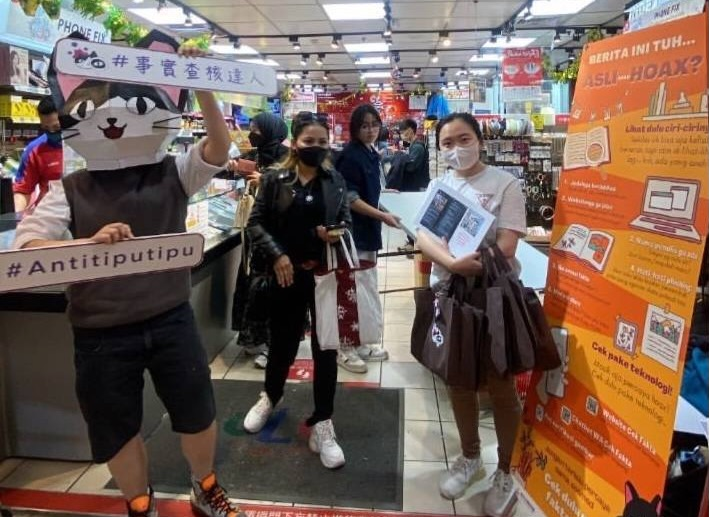Media Literacy in Taiwan: A collaborative Effort Addressing Challenges for the 250,000-strong Indonesian Community

Riley Chou
The Taiwan FactCheck Center (TFC) is collaborating with the Taiwanese TransAsia Sisters Association and Indonesian MAFINDO to launch a series of programs spanning both online and offline platforms. The aim is to provide verification knowledge to 250,000 Indonesians in Taiwan, who can be categorized into three major groups, each of which faces distinct challenges in verification.
There were 210,000 migrant workers, 31,000 spouses, and 17,000 students in Taiwan’s Indonesian community, based on 2021 statistics from the Ministry of the Interior and the Ministry of Education. Migrant workers are more susceptible to misinformation regarding employment, and exploitation by employers and agents is common among them. On the other hand, spouses are more likely to encounter residency issues.
"The Indonesian community in Taiwan is substantial, yet they are relatively disadvantaged in terms of digital resources and skills. Reaching this community directly is not a straightforward task," said Septiaji Eko Nugroho, founder and CEO of MAFINDO, an Indonesian fact-checking organization with over 1,000 volunteers, 95,000 online members, and twenty representative offices across Indonesia.
In a media Literacy collaborative project, TFC takes on the role of project coordinator. Together with MAFINDO, they introduced verification tools and provided training to members of the TransAsia Sisters Association (TASAT), enabling them to become seed trainers.
Subsequently, the seed instructors and TASAT extend their outreach to Indonesian communities across Taiwan through onsite activities and grassroots organizing, while maintaining an online collaboration with MAFINDO. This project is supported by Google News Initiative APAC.
“We hope to leverage the combined expertise of three specialized organizations to achieve greater impact," said Summer Chen, the Editor-in-Chief of the Taiwan FactCheck Center.
“In particular, the TASAT has been working in the field of immigration and migrant workers for many years, which can contribute to understanding the real needs and challenges in their daily lives," said Chen.

The Taiwan Factcheck Center, the MAFINDO, and the TransAsia Sisters Association have been actively discussing this project through a series of online meetings.
Identification of the most common scams and the strategy to combat them
Following training provided by TFC and MAFINDO, members of the TASAT identify the most common scams that target Indonesian migrant workers, including romance scams, donation scams, housing scams, fake government scams, and online shopping scams.
TASAT has organized activities "Apakah kamu HOAX-proof?" (Are you a verification expert) to test migrant workers’ verification skills at Taipei Main Station, a well-known weekend gathering place for them. After a fun quiz, TASAT provided an instruction on using verification tools and offered a piece of ChatGPT-generated misinformation with their name on it as a small gift to raise their awareness.

The event "Apakah kamu HOAX-proof? (Are you a verification expert) organized by TASAT in March 2023. TASAT workers and volunteers reached out to Indonesian migrant workers at the Taipei main station.
Hsiao-Chuan Hsia, the founder of TASAT, noted that the majority of scams targeting Indonesian migrant workers take place within their own community.
When migrant workers encounter their native language, they often feel secure. However, perpetrators exploit this sense of security. For example, they may falsely claim that some Indonesian individuals have been injured and require medical expenses, taking advantage of their sympathy, language barrier, and information to scam money.
Now, utilizing image search tools such as Google Lens, they can promptly recognize scams that use a photo of a 2019 capsizing incident off the coast of Keelung to request donations for medical expenses. Although it was a real incident, it occurred back in 2019, with all 16 fishers on board successfully rescued by a neighboring vessel, and no injuries were sustained.

An Indonesian migrant worker joined the verification quiz and took a photo to show her support for media literacy.
Connecting through online and offline platforms, alongside a visit from MAFINDO
In addition to their offline activities, they manage several online platforms. TASAT and MAFINDO launched a Facebook group called 'Komunitas Indo Taiwan Hoax-Proof: Anti Tipu-Tipu!' (Indonesians in Taiwan Against Scams) to share verified information and encourage Indonesian migrant workers to assist each other with verification.

The Facebook group 'Komunitas Indo Taiwan Hoax-Proof: Anti Tipu-Tipu!' (Indonesians in Taiwan Against Scams) created by TASAT and MAFINDO.
When Septiaji Eko Nugroho, the CEO of MAFINDO, visited Taiwan and conducted a lecture in Spetember, they also offered a livestream in the Facebook group. The livestream was viewed over 500 times, indicating that this group is gaining popularity and trust within the community.
In addition, TASAT plans to release a series of shows in Indonesian called the "Tipu-Tipu Series" on their podcast and create videos to share on their popular social media platforms. Septiaji Eko Nugroho also recorded one with the Indonesian Seafarers' Forum (FOSPI), which has a long history of advocacy, to discuss their challenges in combating hoaxes.
"Our goal for this year is to empower the Indonesian community with verification skills and introduce them to Indonesian fact-checking organizations. We also want to collect misinformation from the community to build a comprehensive database. The next step will focus on promoting a chat box hosted by MAFINDO," concluded Summer Chen.

Septiaji Eko Nugroho has led participants to understand the importance of information security through engaging videos and lively discussions

 Yahoo奇摩新聞
Yahoo奇摩新聞 
